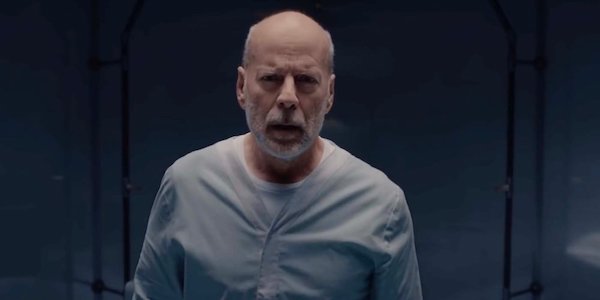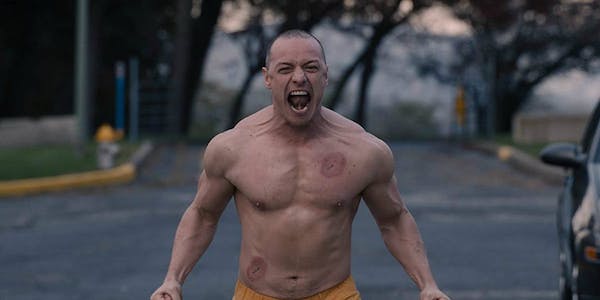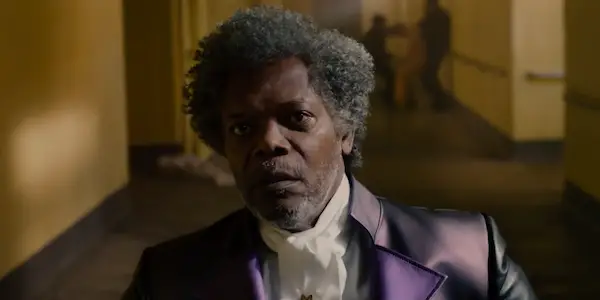GLASS: A Grossly Disappointing Superhero Film

Movie lover & Los Angeles-based writer. BA in Film Criticism…
Since the release of Unbreakable in the fall of 2000, there have been approximately 80,406 superhero films unleashed upon the world. While a few of these franchises have floundered, been forgotten, rebooted, and then promptly floundered and forgotten again (see: Fant4stic Four), many have become wild success stories of megalomaniacal proportions, dominating worldwide box offices and connecting with an audience of billions. As such, we’ve seen the rise of two increasingly common trends in Hollywood.
The first is the want, nay, need for an inter-connected cinematic universe. An intellectual property no longer has the capacity to stand on its own; a sequel must be teased, further installments must be prepared, and fan expectations must be met, not to mention the fact that gainful employment would be secured for the cast and crew members. The epitome of this practice is the Marvel Cinematic Universe; what began as a humble story of a man in an iron suit now spans twenty features and a cavalcade of hundreds of characters, with seemingly no end in sight.
The other trend is a form “auteurist headhunting.” If a filmmaker produces an independent feature film that goes on to receive a fair amount of praise, they are then summarily handed the keys to a $200 million studio project. Their independent feature does not necessarily need to be a financial powerhouse either; a general positive reaction and complete competency behind the camera are sufficient requirements. Recent instances of this include Rian Johnson, whose sci-fi crime-thriller Looper paved the way for him to helm Star Wars Episode VIII: The Last Jedi; Chloé Zhao, who has been tapped to direct Marvel’s The Eternals after producing her masterful (and decidedly much more quaint) The Rider; and Ryan Coogler, whose trajectory went from Fruitvale Station to Creed to Black Panther, the latter being the highest grossing film of 2018.
Enter writer/director M. Night Shyamalan, himself experiencing a major career upswing after an extended period of dire failures. His last film, 2016’s Split, was one of the director’s greatest successes, dominating the January box office and serving as a return to form for the director. As is his wont, Shyamalan included a last-minute twist to Split that ultimately revealed it was, in fact, a pseudo-sequel to Unbreakable, Shyamalan’s deconstructionist take on the superhero genre.

By connecting Split to Unbreakable, Shyamalan has effectively reverse-engineered his own superhero universe and established himself as the director of the next installment. The result is Glass, the latest Shyamalan joint and the third part of what is now apparently known as the “Eastrail 1977 Trilogy.” Proclaimed to be an event “nineteen years in the making,” Glass is Shyamalan’s shot at the big leagues, offering the filmmaker a golden opportunity to craft his very own superhero universe and helm the next installment.
Though working with a relatively minuscule budget of twenty million (the equivalent of craft services on the latest Avengers movie), the marketing for Glass promises to be a climactic showdown of seismic proportions. The reality of Glass is much more disappointing; Shyamalan’s film is a sluggish affair, consistently whiffing a promising setup with an overlong, undercooked, and awfully portentous film. What should have been a full-throated battle cry is instead a dull roar.
Crafting a Superhero Universe
Nineteen years after the events of Unbreakable, David Dunn (Bruce Willis), now a widower, runs a security shop with his son, Joseph (Spencer Treat Clark). By night, the pair share a Bruce Wayne/Alfred dynamic as David dons his poncho and descends upon the city for a bit of covert vigilantism, now dubbed “The Overseer” by the media. David’s quest picks up the trail of Kevin and the Horde (James McAvoy), the disturbed man with twenty-four identities living inside of him. Kevin has recently kidnapped four cheerleaders with the intention of feeding them to The Beast, the deadliest of his personalities.
Though David manages to intercept Kevin and foil his plan, the two are apprehended by law enforcement before they can properly duke it out, and are immediately whisked away to a mental institution, placed under the watchful eye of Dr. Ellie Staple (Sarah Paulson). A firm skeptic, Dr. Staple sets out to dispel the notion that her patients are not superheroes, but regular people that are suffering from ill-advised delusions of grandeur. Also incarcerated is Elijah Price (Samuel L. Jackson), the brittle-boned antagonist of Unbreakable, now heavily medicated into a state of apparent catatonia.

Operating at a slow, occasionally punishing 129 minutes (his longest film to date), Shyamalan takes his time reacclimating his audience to the worlds of Unbreakable and Split. We are first reintroduced to Kevin, with Shyamalan gifting McAvoy an abundant amount of screen time to showcase each of his personalities, often cycling through identities mid-sentence (most, if not all 24 of them get a moment in the sun). And then there’s David, who utilizes his clairvoyant ability of touch to hunt down wrongdoers under the guise of his shadowy cape.
Glass frequently teases a showdown between the unbreakable man and the unstoppable beast, but the film is actually a much more insular journey, with the majority of the proceedings confined within the walls of the mental institution, where the two opponents are locked away in retrofitted cells that exploit their weaknesses (a complex water irrigation system for David, a series of hypnotic light bulbs for Kevin). Shyamalan devotes much of his screen time to the treatments of Dr. Staple, culminating in a bravura set-piece that sees her psychoanalyzing David, Simon, and Elijah in the same room. It’s easily the best sequence in the film.
Thrilling Performances, Not So Thrilling Action
As far as the pros go, Glass is enthusiastically performed by its three leads. McAvoy could be construed as overacting, but his nimble performance as The Horde is at least entertaining to watch, if only for how energetic and breathless it is. Willis shows an uncommon amount of alertness as David, arguably giving his best performance in the last five years. But the real star of Glass is the eponymous figure himself. Jackson comes to life in the second half as the mischievous mastermind, using his cool-as-ice charisma and wily powers of manipulation to wield the power of The Beast. Glass comes alive whenever Jackson appears on screen, and the film sure could have used more of him.
Paulson also makes for a welcome presence, playing with just the right amount of intrigue as she keeps her role close to the chest. More perplexing is the inclusion of Charlayne Woodard, reprising her role as Mrs. Price, Elijah’s doting mother, and Anya Taylor-Joy, returning as Casey Cooke, the lone survivor from Kevin’s rampage in Split. The latter is particularly baffling, with Shyamalan offering no logical reason as to why a tortured girl would return to see her murderous captor. One of many big questions unceremoniously swept under the rug.

Glass gradually builds towards The Big Fight, pitting David against Kevin as Elijah watches proudly from the sidelines. For all of its chest-puffing and deep-seated villainy, the final confrontation is surprisingly anti-climactic, offering little in the way of a proper showdown between the two foes. Just when Glass starts to get the blood pumping, Shyamalan is quick to reel it back in, delivering a half-hearted climax unfit for a superhero movie. For the fans going in hoping to see a rollicking smash ’em up, it’d be best to temper your expectations now.
Speaking of which, the action (or what little there is) is another major problem. Shyamalan has never been a gifted action director (just ask anyone who has seen The Last Airbender), but he feels particularly lost at sea here, utterly inept at staging even the most basic of mano-a-mano confrontations. Framing is usually kept tight on the combatants, lacking the proper room to breathe, and there’s an unusual over-reliance on body-cam footage, lending a hacky appearance to the fight sequences. Further issues include Shyamalan’s frequent return to Unbreakable, with the director often reincorporating actual footage from that film into the narrative of Glass, creating an unintentionally jarring effect.
Glass: Conclusion
Shyamalan being Shyamalan, Glass doesn’t know when to quit, overextending its welcome by twenty minutes as the director piles on twist after twist, each one growing more preposterous than the last. While I wouldn’t dare spoil anything here, I will say that the ending is not satisfying in the least, lacking the urgency and emotional resonance Shyamalan appeared to have been aiming for. Glass may have been a film nineteen years in the making, but it feels superfluous and incredibly out of touch in a world littered with superhero films.
What do you think? Was Glass worth the wait? Let us know your thoughts in the comments below!
Glass was released in theaters in the US and the UK on January 18, 2019. For all international release dates, see here.
Does content like this matter to you?
Become a Member and support film journalism. Unlock access to all of Film Inquiry`s great articles. Join a community of like-minded readers who are passionate about cinema - get access to our private members Network, give back to independent filmmakers, and more.
Movie lover & Los Angeles-based writer. BA in Film Criticism & Media Theory from CSU Northridge. Unofficial Bond ally. Rhymes with “tequila.”













